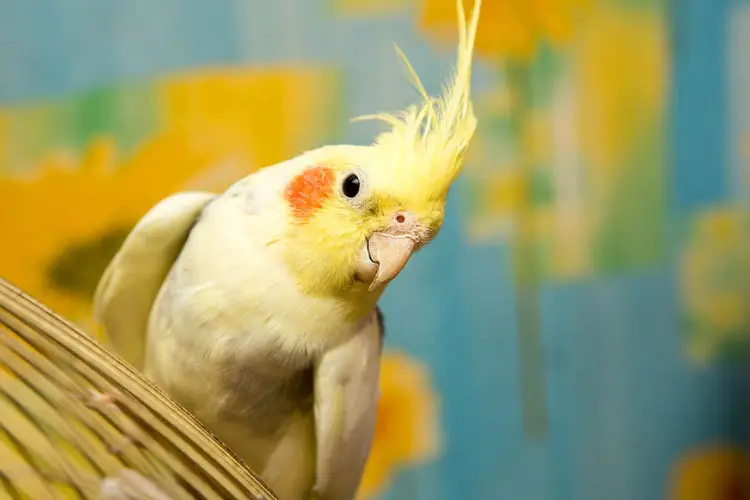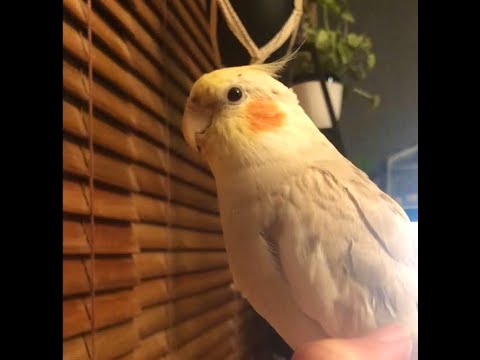Among the popular birds capable of talking are myna in the starling family, songbirds, and parrots. Parrots like the African gray can memorize and talk over a thousand words, while budgerigars hold the record with an estimated 1728 words. However, what about cockatiels?
Can cockatiels talk? Like most psittacine birds, cockatiels can talk and mimic nonavian sounds, including human speech. Their voice doesn’t match exactly that of humans, but they can whistle understandable words. Cockatiels must imitate words and sounds to learn and memorize for the long term.
Talking is among the favorite activities for bird owners with an active and social pet bird. This article covers the things you should know about cockatiels talking and mimicking habits.
Do Cockatiels Talk?
For humans to talk, they use their voice box to produce vocals that are then passed and shaped through the mouth. Generally, lips and teeth control words when their chords reach the mouth through the trachea. However, despite lacking all these, parrots like cockatiels can talk. While their voice is not clear, they whistle words and sounds that are interpretable.
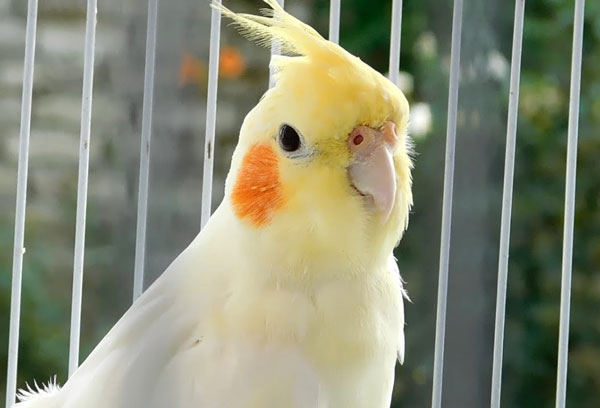
Unlike humans, cockatiel’s voice box, known as the syrinx, is located at the bottom of their trachea, from which sounds are produced. The bird’s voice box contains vibrating membranes and muscles that influence airflow to create sounds. Cockatiels, among other parrots, have two independent voice boxes and can produce two voices at the same time.
While they lack lips to curve words, researchers found that tongues make parrots smooth talkers. They move their tongues back and forth to adjust the pitch, allowing them to use a high or low key while talking. They also adjust their beaks along with the tongue to alter sounds and create some words.
Do Cockatiels Mimic?
Mimicry is the action of imitating a sound or words, which is evident in humans and some birds. A cockatiel can mimic and repeat words by whistling them back as they are altered. They can also mimic the actions done by the person they are imitating. Birds are also able to whistle back songs taught to them.
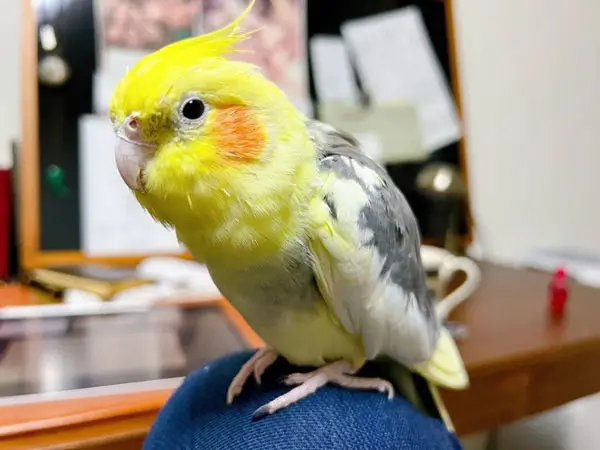
To produce plosive sounds which humans use lips, parrots use esophageal speech by holding and releasing air. This enables them to mimic and alter words like “good bird,” which is a popular word among bird lovers. Cockatiels learn and widen their vocabulary by mimicking words they hear repeatedly and memorize.
At What Age Do Cockatiels Start Talking?
Most cockatiel owners can’t wait for their birds to grow and learn to mimic and talk. Luckily, these birds are born communicators who, from hatching, they start processing and learning right away. However, at that age, they only learn other birds’ calls and memorize their parents’ chirps.
Cockatiels are more trainable and tamable after eight months, which is shortly after their first molt. Some birds chirp and make talking noises as early as four months as juveniles and untamed. At adult age, the birds are more attentive to their surroundings and capable of hearing words and mimicking.
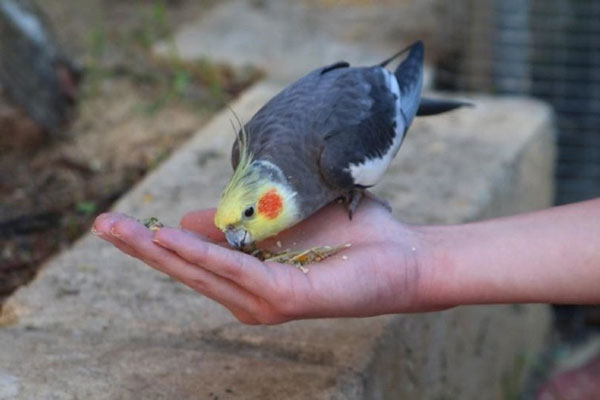
While at it, you will realize that male cockatiels talk more than their female counterparts. Their melodious voices are sweet, only that they vocalize aggressively from around 6 months. As time goes by, they keep growing their sounds, and listening to them becomes even more exciting.
But this doesn’t mean that the female ones don’t mimic or sing. They also talk, only that they are less vocal. Normally, female cockatiels have no urge to imitate the sounds they hear. To train a female cockatiel how to talk, you need to involve treats and a lot of compliments.
How Do I Teach My Cockatiel to Talk?
Talking improves communication and the bond between a bird and its owner. The bird can show interest in talking by mimicking some of the words you say or sounds made in its environment. The following are some ways to teach your bird to talk.
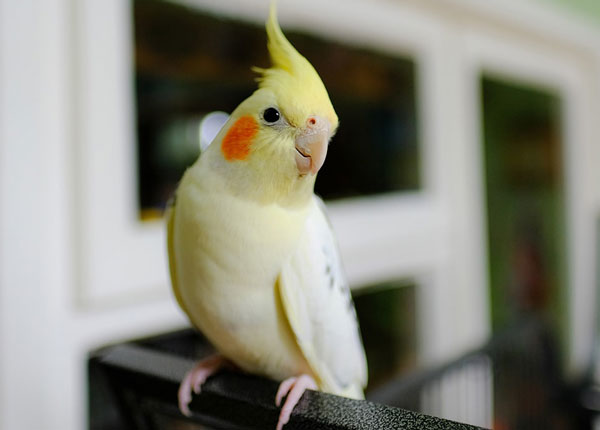
1. Bonding Often
Teaching your cockatiel to talk involves a lot of time together, and it must be comfortable around you. Bond with your cockatiel to improve its trust and confidence while interacting with you. This will increase the chance of the cockatiel learning, and you’ll be able to choose the best time when it’s active.
2. Filtering Words
Despite their ability to talk, birds can’t say all words said by humans, especially if they’re complex. Just like teaching babies, introduce easy and memorable words to them, after which you can follow with harder ones. Some beginner words include hello, hey, hola, bye-bye, goodbye, nite-nite, and the bird’s name if it’s simple.
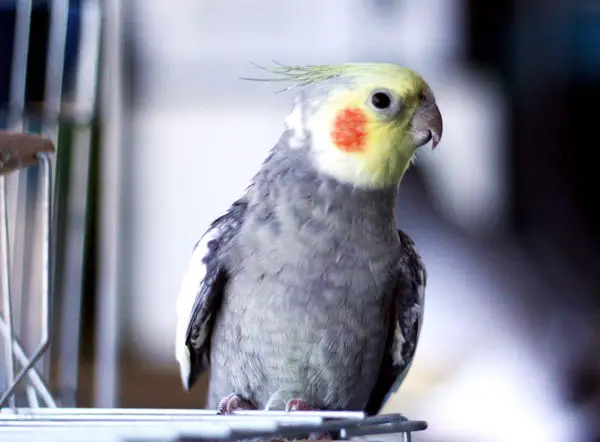
3. Repeating Words
Since birds memorize words by repeating them, repeat the words regularly to encourage the bird to learn. The words should also be said enthusiastically and clearly for the cockatiel to understand. Avoid mixing multiple words, which can confuse the bird and discourage learning.
4. Exercising patience
Most birds take up to two months to learn and memorize at least one word. To teach them more, you must be patient and consistent. Otherwise, the bird will forget the words it learned already. However, after learning the first letters, birds easily learn other words in less time.
It’s important to note that for your cockatiel to talk, it must feel free with you. You shouldn’t lock them up all the time and expect them to learn how to talk. You realize all the above tips help you get closer to your cockatiel. When you do so, it will be so easy for them to learn that you will be surprised at how it happened.
What Sounds Can Cockatiels Mimic?
As masters of mimicry, parrots, including cockatiels, can mimic many words and sounds. While their popularity is in mimicking human words, in the wild, they also mimic other birds. The following are the various sounds cockatiels can mimic.
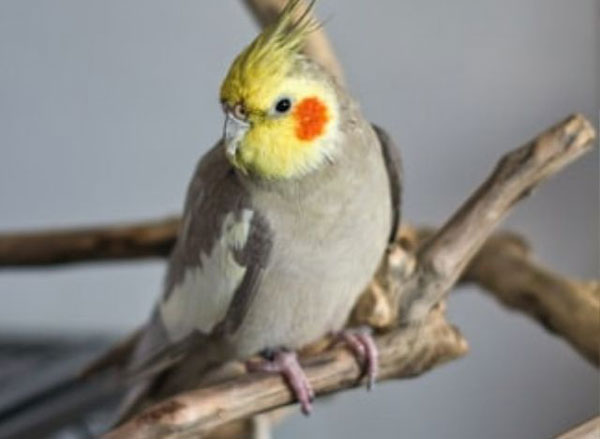
1. Environmental Sounds
Cockatiels can imitate sounds in the environment, like tapping, dripping, knocking, clanking, squeaking, and even footsteps. The sound, however, must be loud enough for the bird to hear it.
2. Gadget Sounds
With many electronics in homes nowadays, cockatiels can hear and mimic most of them. They include alert beeping, alarm clocks, drum beats, TV noise, piano chords, radio, ringtones, doorbells, and a song.
3. Animals Sounds
Among the early sounds cockatiels mimic are other animal sounds, starting with their mother or cage mates. They can also imitate a dog’s back, a cat’s meow, a chicken’s cluck, a cricket chirp, and other whistles from other birds.
4. Human Sounds
Cockatiels are popular for their mimicry of human speech and their ability to learn words. They can also mimic sounds like coughing, sneezing, whistling, laughing, humming, crying, and talking.
With this, you realize that you don’t have to stress over your cockatiel talking. It is a natural thing that you don’t need to force because they will still learn. If your cockatiel seems dull and unwilling to learn various sounds, it may be stressed or not in a good mod. You should find different ways of making it get used to the environment.
Do Cockatiels Understand What They Say?
While cockatiels can mimic and talk, in most cases, they don’t understand what they say. They only repeat words uttered by their owners as a way to bond and communicate with them. However, some trained parrots, like the African grey parrot called Alex, seemed to give answers to questions they were asked. They exhibit an unmatched level of intelligence.
Despite not knowing what the words mean, cockatiels can be trained and learn words. The training is not necessarily to teach them the meaning of words but help them associate them with some things. For instance, you can associate the word bye-bye with leaving the room, which the bird will soon understand.
Video
Related Questions
While talking is not in every bird species, the lucky few who can talk raise more questions among owners. These questions are mainly aimed at understanding the birds’ capabilities, as well as their flaws. The following are the frequently asked questions about this topic.
Both male and female cockatiels can talk and mimic sounds and words they hear. However, males are known to be more active than females, which is actually a way to tell the genders apart. The males are also more vocal during the breeding season.
The common way to get your cockatiel to talk is by training it. The bird must be of age, healthy, and bonded so that it can be comfortable while learning and understanding the lessons. Teach the bird easier words first before advancing to more complex ones. Cockatiels can also learn whistled songs faster, but you can either teach them one skill at a time.
Cockatiels are natural whistlers and can mimic songs and sounds. They can learn a new song and whistle it as well as a human would in near-perfect synchronicity to the original song. To teach them, you can whistle the song and let them follow you through.
Outro
Parrots are the most capable of all birds, with the ability to talk and mimic human words. They possess a syrinx, which is a voice box from which their notes are made before passing through the trachea to the mouth. Parrots use their tongues to modulate the pitch by moving it forward and backward in the mouth.
Cockatiels can talk and mimic words and musical notes with great precision and accuracy. Most birds are taught to speak after their first molt by patiently repeating words over to them until they memorize them. Other than human speech, cockatiels can also learn and mimic other sounds like tapping sound, an alarm, and a human cough.
